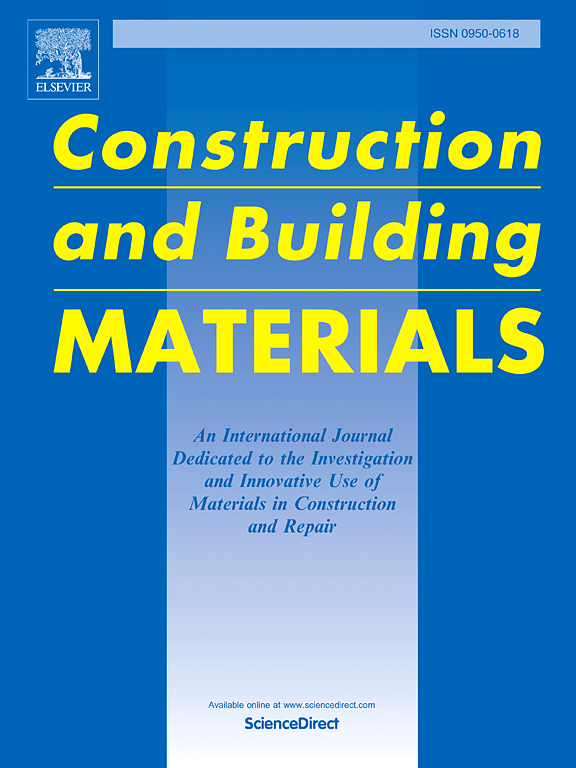提高混凝土建筑的可持续性:利用铜渣改善土工聚合物混凝土的性能
IF 8
1区 工程技术
Q1 CONSTRUCTION & BUILDING TECHNOLOGY
引用次数: 0
摘要
土工聚合物混凝土(GPC)使用硅酸铝前体材料作为粘结剂,是波特兰水泥混凝土的环保型替代品。这些前体材料通常包括偏高岭土、火山灰等自然资源,以及粉煤灰(FA)和磨细高炉矿渣(GGBFS)等工业固体废弃物。然而,尽管不使用水泥,但由于使用天然骨料,GPC 仍然面临环境挑战,导致资源枯竭。为了缓解这一问题,研究人员探索了用废料替代天然骨料,既有助于节约资源,又有助于废物管理。铜渣(CS)就是这样一种具有在 GPC 中用作细骨料潜力的废料。本研究对以 FA-GGBFS 为基础、将 CS 用作细骨料的 GPC 进行了全面评估,结果显示其在运输、耐久性和强度性能方面都有显著提高。与仅使用天然砂制成的对照试样相比,在 GPC 中用 CS 替代 60% 天然砂的最佳方法使抗压强度提高了 20-25%,抗滑耐久性提高了 10-15%,吸水率降低了 18-40%,渗透空隙减少了 30-39%,磨损深度降低了 26-47%。因此,建议在 GPC 中加入希尔思作为细骨料,这是提高机械性能和耐久性的有效方法,同时也有助于可持续建筑实践。本文章由计算机程序翻译,如有差异,请以英文原文为准。
Enhancing sustainability in concrete construction: Utilizing copper slag for improved properties of geopolymer concrete
Geopolymer concrete (GPC), utilizing aluminosilicate precursor materials as binders, stands as an eco-friendly alternative to Portland cement concrete. These precursors commonly include natural resources like metakaolin, volcanic ash, and industrial solid waste such as fly ash (FA) and ground granulated blast furnace slag (GGBFS). However, despite not utilizing cement, GPC still faces environmental challenges due to the use of natural aggregates, leading to resource depletion. To mitigate this issue, researchers have explored replacing natural aggregates with waste materials, aiding both resource conservation and waste management. Copper slag (CS) is one such waste material with potential as fine aggregate in GPC. This study conducts a comprehensive evaluation of FA-GGBFS-based GPC incorporating CS as fine aggregate, revealing notable enhancements in transport, durability, and strength properties. The optimal replacement of 60 % natural sand with CS in GPC resulted in a 20–25 % increase in compressive strength, a 10–15 % improvement in slake durability, an 18–40 % reduction in water absorption, a 30–39 % decrease in permeable voids, and a 26–47 % reduction in depth of wear, all in comparison to the control specimen made with natural sand only. Thus, incorporating CS as a fine aggregate in GPC is recommended as an effective approach to enhance mechanical performance and durability, while contributing to sustainable construction practices.
求助全文
通过发布文献求助,成功后即可免费获取论文全文。
去求助
来源期刊

Construction and Building Materials
工程技术-材料科学:综合
CiteScore
13.80
自引率
21.60%
发文量
3632
审稿时长
82 days
期刊介绍:
Construction and Building Materials offers an international platform for sharing innovative and original research and development in the realm of construction and building materials, along with their practical applications in new projects and repair practices. The journal publishes a diverse array of pioneering research and application papers, detailing laboratory investigations and, to a limited extent, numerical analyses or reports on full-scale projects. Multi-part papers are discouraged.
Additionally, Construction and Building Materials features comprehensive case studies and insightful review articles that contribute to new insights in the field. Our focus is on papers related to construction materials, excluding those on structural engineering, geotechnics, and unbound highway layers. Covered materials and technologies encompass cement, concrete reinforcement, bricks and mortars, additives, corrosion technology, ceramics, timber, steel, polymers, glass fibers, recycled materials, bamboo, rammed earth, non-conventional building materials, bituminous materials, and applications in railway materials.
 求助内容:
求助内容: 应助结果提醒方式:
应助结果提醒方式:


